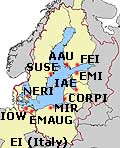Workpackages
Objectives:
- Develop a typology for the Baltic ecoregion on the basis of hydrographic and biological variables.
- Evaluate and modify the typology with respect to the biological indicators of the Water Framework Directive.
Lead participant: Baltic Sea Research Institute
Objectives:
- Identify factors regulating biomass and structure of phytoplankton communities on both local and regional scales.
- Develop phytoplankton community indexes that adequately describe the state of coastal waters, and are applicable for cost-effective monitoring.
- Develop numerical links between phytoplankton indices to other quality elements (benthic fauna and macrophytes).
- Derive reference conditions for phytoplankton in all type areas.
Lead participant: Environmental Institute, Joint Research Centre
Objectives:
- Develop conceptual models for macrophytes as indicators of the state of coastal ecosystems.
- Identify factors regulating macrophyte communities and their temporal stability at both local and regional scales in the Baltic Sea.
- Identify major changes in the vegetation through the last century by comparing present and historic vegetation surveys.
- Identify macrophyte indicators that adequately describe the state of coastal ecosystems.
- Define reference conditions for benthic vegetation in different areas of the Baltic Sea.
Lead participant: National Environmental Research Institute
Objectives:
- Compile and analyse existing information on benthic infauna in Baltic coastal waters.
- Identify and explain qualitative and quantitative relationships between benthic infauna and other ecological state variables in relation to environmental change.
- Reconstruct reference conditions for benthic assemblages.
- Contribute to an overall monitoring strategy using selected zoobenthic quality elements.
Lead participant: Aabo Akademi University
Objectives:
- To supply data on hydrography and freshwater for the calculations of water residence times in WP2
- To supply quality assured data on water chemistry, Secchi depth and oxygen for the development of typology criteria in WP2, 3, 4, 5, 6, 7.
- Evaluate and calculate water quality, in terms of nutrient data, in relation of oxygen conditions and nutrient loads for selected coastal regions.
- Estimate pristine coastal nutrient concentrations in selected coastal regions
Lead participant: Stockholm University, Department of System Ecology
Objectives:
- To evaluate the existing monitoring activities within the Baltic Sea ecoregion and study the applicability of those in relation to the requirements of WFD.
- To develop an efficient marine monitoring strategy focusing on coastal waters and biological parameters according the requirements of WFD.
Lead participant: University of Latvia, Institute of Aquatic Ecology
Objectives:
- To strengthen the contacts between scientists and authorities in the work with implementation of the EC Water Framework Directive in the Baltic Sea Ecoregion
- To provide the national authorities with scientifically base type areas in the Baltic Sea ecoregion
- To provide the national authorities with scientifically based reference conditions in the defined type areas
Lead participant: Stockholm University, Department of System Ecology
|
 Map of the Baltic Sea with drainage bassin and institutions participating in the CHARM project.
Click on the map to go to institutions.
Map of the Baltic Sea with drainage bassin and institutions participating in the CHARM project.
Click on the map to go to institutions.
The map is modified from Baltic Environmental Atlas
|


 Map of the Baltic Sea with drainage bassin and institutions participating in the CHARM project.
Click on the map to go to institutions.
Map of the Baltic Sea with drainage bassin and institutions participating in the CHARM project.
Click on the map to go to institutions.